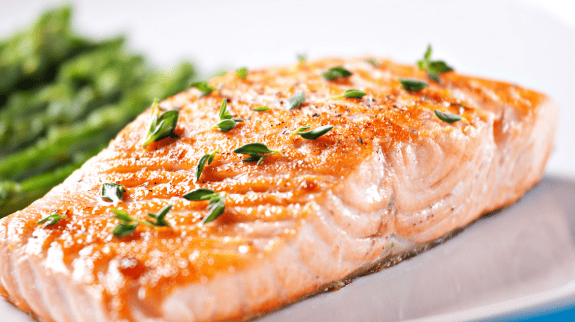The carnivore diet is a diet that involves consuming only animal products, such as meat, fish, and eggs. It is a high-fat, high-protein diet that eliminates all plant-based foods, including fruits, vegetables, and grains. The diet has gained popularity in recent years, with proponents claiming that it can lead to weight loss, improved mental clarity, and better overall health.
The high fat and protein content of this diet can help increase feelings of satiety and reduce cravings for carbohydrates. However, the lack of carbohydrates can make it challenging for some people to bulk or gain weight on the carnivore diet, especially if they are not consuming enough calories.
KEY TAKEAWAYS
- The carnivore diet involves consuming only animal products and eliminating all plant-based foods.
- The high-fat and moderate-protein content of the carnivore diet can help increase feelings of satiety and reduce cravings for carbohydrates.
- Gaining weight on the carnivore diet may require consuming enough calories, monitoring progress, and potentially incorporating exercise and supplements.
Understanding the Carnivore Diet
One of the key principles of the carnivore diet is that animal protein is more bioavailable than plant-based protein. This means that it is easier for the body to absorb and use the protein found in animal products. The diet is also high in fat, which provides the body with a source of energy and helps to keep the dieter feeling full and satisfied.
The carnivore diet has been popularized by figures such as Dr. Shawn Baker and Kevin Stock, who have both reported significant health benefits from following the diet. However, it is important to note that the diet is not without its critics. Some nutrition experts have raised concerns about the potential risks associated with consuming a diet that is so high in animal products.
The Role of Protein in Weight Gain
Importance of Adequate Protein
Protein is an essential macronutrient that plays a crucial role in building and repairing tissues, including muscle tissue.
According to a study published in the Nature journal, consuming a high-protein diet can lead to weight loss and weight gain, depending on the individual’s energy intake.
So consuming an adequate amount of protein is essential for maintaining muscle mass and promoting muscle growth.
Protein and Muscle Growth
Muscle growth occurs when the body repairs and rebuilds muscle fibers that have been damaged during physical activity. Protein provides the necessary amino acids that the body needs to repair and rebuild muscle tissue.
According to a study published in the Journal of the International Society of Sports Nutrition, consuming a high-protein diet can lead to an increase in muscle mass and muscle strength. Therefore, it is essential to consume an adequate amount of protein while following the carnivore diet to support muscle growth and weight gain.
The Significance of Fat in the Carnivore Diet

Fat is a crucial component of the carnivore diet, as it provides energy and helps to maintain weight. When following a carnivore diet, the body uses fat as its primary source of energy instead of carbohydrates. Fat is a more efficient source of energy, providing more energy per gram than carbohydrates.
Also read: How to get enough fat on the carnivore diet
Exercise and the Carnivore Diet

When it comes to gaining weight on the carnivore diet, exercise can play a crucial role. While the diet itself can lead to weight gain due to its high protein and fat content, incorporating exercise can help build muscle and promote overall fitness.
Strength Training
Strength training is an effective way to build muscle and gain weight on the carnivore diet. This type of exercise involves using weights or resistance to challenge the muscles and promote growth.
To build muscle it’s important to focus on compound exercises that work multiple muscle groups at once. Some examples of compound exercises include squats, deadlifts, bench presses, and pull-ups. These exercises can be done with free weights or machines, depending on the individual’s preference and experience level.
In addition to compound exercises, isolation exercises can also be incorporated to target specific muscle groups. For example, bicep curls and tricep extensions can help build arm muscles.
Building a Routine
To see results from exercise nothing is more important than establishing a consistent routine. This can involve setting aside a specific time each day or week for exercise, as well as choosing exercises that are challenging but manageable.
Remember you’re in this for the long haul, so for beginners, it may be helpful to start with lighter weights and fewer reps, gradually increasing the weight and reps over time. It’s also important to listen to the body and rest when needed, as overexertion can lead to injury, which will sideline you for longer than a day off would.
In addition to strength training, incorporating other forms of exercise such as cardio and stretching can promote overall fitness and health. This can include activities such as running, cycling, yoga, or Pilates.
Nutrition and Supplements

Vitamins and Minerals
The carnivore diet is rich in essential vitamins and minerals, but some may need to supplement their diet to ensure they are getting enough of certain nutrients including vitamin C, vitamin E and fiber.
Other supplements that may be beneficial for those on the carnivore diet include omega-3 fatty acids, which can be found in fatty fish and can help reduce inflammation, and magnesium, which is important for muscle and nerve function and can be found in meat, nuts, and leafy greens.
Also read: Best supplements for the carnivore diet 2023
Creatine
Creatine is a popular supplement among athletes and bodybuilders, and can be beneficial for those on the carnivore diet looking to gain muscle mass. Creatine is naturally found in meat, but by supplementing your diet with creatine monohydrate you can increase muscle strength and size.
Monitoring Your Progress
When following the carnivore diet, it is important to monitor your progress to ensure that you are gaining weight in a healthy and sustainable way. Tracking your weight and body composition can help you determine if you are on the right track and make any necessary adjustments to your diet.
Tracking Weight and Body Composition
One way to track your progress is to weigh yourself regularly and keep a record of your weight. It is important to weigh yourself at the same time each day, preferably in the morning before eating or drinking anything.
In addition to tracking your weight, you can also monitor your body composition using a body fat scale. These scales use bioelectrical impedance analysis to measure your body fat percentage, muscle mass, and other important metrics. This can give you a more accurate picture of your progress and help you adjust your diet accordingly.
Understanding Scale Fluctuations
It is important to understand that your weight can fluctuate from day to day due to factors such as hydration, digestion, and hormonal changes. For this reason, it is important to look at your weight trends over time rather than focusing on daily fluctuations.
In addition to tracking your weight and body composition, you can also monitor your progress by keeping a food diary. This can help you track your calorie intake and ensure that you are getting enough protein and other essential nutrients.
Potential Challenges and Solutions

Dealing with Cravings
One of the potential challenges of the carnivore diet is dealing with cravings. Since the diet eliminates most carbohydrates, which are known to trigger cravings, some people may experience intense cravings for sugary or starchy foods.
To address this challenge, it is important to ensure that the diet is well-balanced and includes enough protein and fat. Consuming enough protein can help to keep you feeling full and satisfied, while healthy fats can help to provide energy and prevent cravings. Some good sources of healthy fats include fatty cuts of meat, butter, and coconut oil.
Another strategy for dealing with cravings is to distract yourself with other activities, such as going for a walk, reading a book, or practicing a hobby. This can help to take your mind off of food and reduce the intensity of cravings.
Constipation on the Carnivore Diet
Another potential challenge of the carnivore diet is constipation. Since the diet is low in fiber, some people may experience difficulty with bowel movements.
To address this challenge, it is important to ensure that you are consuming enough water and electrolytes. Dehydration can exacerbate constipation, so it is important to drink plenty of water throughout the day. Additionally, consuming electrolytes, such as sodium, potassium, and magnesium, can help to maintain proper hydration and support healthy bowel movements.
Another strategy for addressing constipation is to consume small amounts of low-carb vegetables, such as leafy greens or broccoli. While these foods are not technically part of the carnivore diet, they can provide some fiber and help to support healthy digestion.
Meal Planning and Recipes

When following a carnivore diet for weight gain, meal planning is crucial to ensure adequate nutrient intake and variety. The diet primarily consists of animal-based foods such as meat, fish, and eggs. These foods are rich in protein, healthy fats, vitamins, and minerals.
To add variety to the diet, one can experiment with different cooking methods and seasonings. Grilled, roasted, or pan-fried meats can be paired with herbs and spices such as rosemary, thyme, garlic, and ginger. For a quick and easy snack, beef jerky or pork rinds can be consumed.
Also read: Best carnivore diet snacks
Tallow, a form of rendered beef fat, can also be used in cooking and as a source of healthy fats. It has a high smoke point, making it suitable for frying and sautéing. Tallow can also be used as a spread or added to coffee for a nutrient-dense beverage.
Here are some simple carnivore diet recipes to try:
By incorporating a variety of meats and experimenting with different cooking methods and seasonings, meal planning on the carnivore diet can be both enjoyable and nutritious.
Long-Term Commitment and Patience
Following a carnivore diet for weight gain requires a long-term commitment and patience. You need to have a clear focus on your goal and be willing to commit to the diet for an extended period. The diet’s effectiveness in achieving weight gain is dependent on the your commitment to the diet’s strict guidelines.
Unlike other diets, the weight gain process on the carnivore diet may take longer. So you should not expect to see significant results in a short period. It is essential to track progress and make adjustments as necessary.
Understand that the carnivore diet requires a high level of commitment and discipline.
Conclusion
In conclusion, the carnivore diet can be an effective way to gain weight for those who struggle to put on pounds. By consuming a diet high in protein and healthy fats, individuals can increase their caloric intake and promote muscle growth.
However, it is important to note that the carnivore diet may not be suitable for everyone, especially those with pre-existing health conditions. Before starting any new diet, it is recommended to consult with a healthcare professional to ensure it is safe and appropriate.
While the carnivore diet may provide weight gain benefits, it is still important to prioritize overall health and wellness. Incorporating physical activity and a variety of nutrient-dense foods can help support optimal health and fitness.
Frequently Asked Questions
How do you gain weight and muscle on a carnivore diet?
To gain weight and muscle on a carnivore diet, you must consume more calories than you burn. This can be achieved by increasing the portion sizes of meals and adding calorie-dense foods to the diet. Additionally, incorporating strength training exercises into the routine can help build muscle mass.
How do you gain weight and muscle on a carnivore diet?
To gain weight and muscle on a carnivore diet, you must consume more calories than you burn. This can be achieved by increasing the portion sizes of meals and adding calorie-dense foods to the diet. Additionally, incorporating strength training exercises into the routine can help build muscle mass.
What are some high calorie foods to eat on a carnivore diet?
Some high calorie foods to eat on a carnivore diet include fatty cuts of meat such as ribeye steak, ground beef, and pork belly. Organ meats like liver and heart are also high in calories and can provide essential nutrients.
Can you gain weight with carnivore diet?
Yes, it is possible to gain weight on a carnivore diet by consuming more calories than one burns. However, it is important to note that weight gain should be done in a healthy and sustainable manner.
What are some tips for gaining weight on a carnivore diet?
Some tips for gaining weight on a carnivore diet include increasing portion sizes, incorporating calorie-dense foods into the diet, and consuming enough protein to support muscle growth. It is also important to stay hydrated and get enough rest to support recovery and muscle growth.
What are some tips for gaining weight on a carnivore diet?
Some tips for gaining weight on a carnivore diet include increasing portion sizes, incorporating calorie-dense foods into the diet, and consuming enough protein to support muscle growth. It is also important to stay hydrated and get enough rest to support recovery and muscle growth.
How much protein should I eat to gain weight on a carnivore diet?
The amount of protein needed to gain weight on a carnivore diet varies depending on factors such as age, gender, weight, and activity level. As a general guideline, consuming 1-1.5 grams of protein per pound of body weight per day can support muscle growth.
What are some common mistakes people make when trying to gain weight on a carnivore diet?
Some common mistakes include not consuming enough calories, not consuming enough protein, not incorporating strength training exercises into their routine, and not getting enough rest and recovery time. It is important to be patient in your approach weight gain and come at it from a healthy and sustainable manner to avoid negative health consequences or injury.

